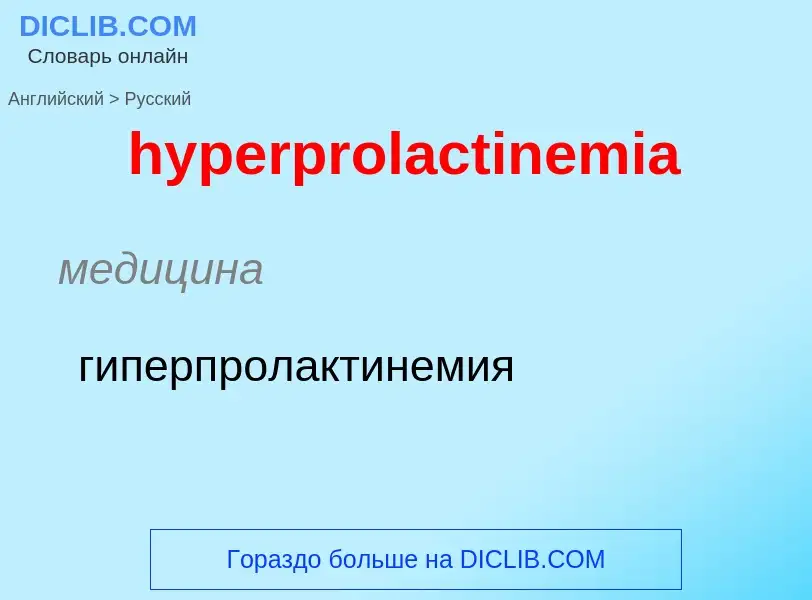Übersetzung und Analyse von Wörtern durch künstliche Intelligenz ChatGPT
Auf dieser Seite erhalten Sie eine detaillierte Analyse eines Wortes oder einer Phrase mithilfe der besten heute verfügbaren Technologie der künstlichen Intelligenz:
- wie das Wort verwendet wird
- Häufigkeit der Nutzung
- es wird häufiger in mündlicher oder schriftlicher Rede verwendet
- Wortübersetzungsoptionen
- Anwendungsbeispiele (mehrere Phrasen mit Übersetzung)
- Etymologie
hyperprolactinemia - Übersetzung nach russisch
медицина
гиперпролактинемия
Wikipedia

Hyperprolactinaemia is the presence of abnormally high levels of prolactin in the blood. Normal levels average to about 13 ng/mL in women, and 5 ng/mL in men, with an upper normal limit of serum prolactin levels being 15-25 ng/mL for both. When the fasting levels of prolactin in blood exceed this upper limit, hyperprolactinemia is indicated.
Prolactin (PRL) is a peptide hormone produced by lactotroph cells in the anterior pituitary gland. PRL is involved in lactation after pregnancy and plays a vital role in breast development. Hyperprolactinemia may cause galactorrhea (production and spontaneous flow of breast milk), infertility, and disruptions in the normal menstrual period in women; as well as hypogonadism, infertility and erectile dysfunction in men.
Although hyperprolactinemia can result from normal physiological changes during pregnancy and breastfeeding, it can also be caused by other etiologies. For example, high prolactin levels could result from diseases affecting the hypothalamus and pituitary gland. Other organs, such as the liver and kidneys, could affect prolactin clearance and consequently, prolactin levels in the serum. The disruption of prolactin regulation could also be attributed to external sources such as medications.
In the general population, the prevalence of hyperprolactinemia is 0.4%. The prevalence increases to as high as 17% in women with reproductive diseases, such as polycystic ovary syndrome. In cases of tumor-related hyperprolactinemia, prolactinoma is the most common culprit of consistently high levels of prolactin as well as the most common type of pituitary tumor. For non-tumor related hyperprolactinemia, the most common cause is medication-induced prolactin secretion. Particularly, antipsychotics have been linked to a majority of non-tumor related hyperprolactinemia cases due to their prolactin-rising and prolactin-sparing mechanisms. Typical antipsychotics have been shown to induce significant, dose-dependent increases in prolactin levels up to 10-fold the normal limit. Atypical antipsychotics vary in their ability to elevate prolactin levels, however, medications in this class such as risperidone and paliperidone carry the highest potential to induce hyperprolactinemia in a dose-dependent manner similar to typical antipsychotics.


